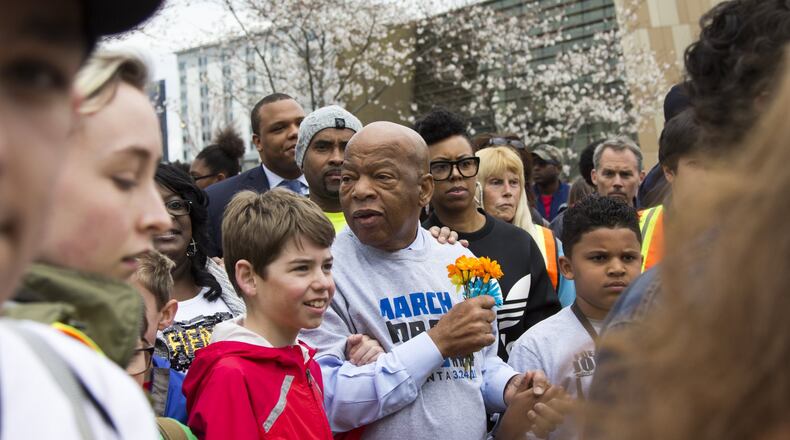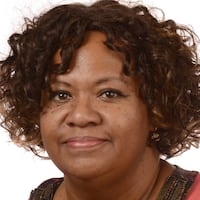In Atlanta and Washington, in Dahlonega and Parkland, in more than 800 cities across the nation, Americans marched Saturday against gun violence, trying to transform a moment of outrage into a movement for change.
"Enough is enough!" chanted Atlanta protesters, estimated by police to number 30,000. "Not one more!"
The March for Our Lives was a response to the Feb. 14 shooting at Marjory Stoneman Douglas High School in Parkland, Fla., where 17 students and adults died in the latest in a years-long string of devastating attacks.
At rallies nationwide, speakers — many of them students from Marjory Stoneman Douglas — demanded tougher gun laws, such as a ban on assault weapons and expanded background checks of all firearms purchasers. They also acknowledged political realities: the gun lobby remains a powerful force, one that prevented new laws following other massacres.
But the size of Saturday’s crowds – 500,000 or more in Washington, 150,000 in New York, even a few hundred in Dahlonega, a tiny mountain town in North Georgia – suggests a shift in public sentiment.
“This movement is powerful,” U.S. Rep. John Lewis told the Atlanta marchers. “Keep it going. Keep it going. Hang in there and keep it going, and we will have a victory.”
→ ON THE SCENE: Check out photo gallery from the march
Lewis' presence at the front of the Atlanta march evoked an earlier era of unrest and activism. But the day belonged to the young people who have mobilized since the Parkland shooting. Week before last, students staged school walk-outs around the country and in metro Atlanta, and many have challenged politicians and other adults to address the violence that undermines their sense of security.
Carly Novell, a senior at Marjory Stoneman Douglas, told the Atlanta crowd about hiding in a closet during the shooting and about losing one of her best friends in the carnage. It is up to the young, she said, to act.
“Together, our generation will be the ones to save our country,” Novell said. “Our generation will be the ones to truly make America great.”
Atlanta: ‘I’m angry’
The Parkland shooting put pressure on politicians to address school safety and gun violence, and President Donald Trump briefly supported some new firearms laws. But Congress has agreed only to a series of narrow tweaks to existing statutes. Asked about the issue on Friday, U.S. Rep. Karen Handel, R-Roswell, didn’t even mention guns.
“We are focused in Congress on school safety,” Handel said. “What we know is that we need to make sure all the schools around the country are hardened.”
Georgia officials have been especially hostile to the idea of gun control. In fact, the General Assembly adopted a law in 2014 that was widely known as “Guns Everywhere.” It allowed people with permits to carry concealed firearms into bars, school zones, parts of airports and churches. Then the state opened up college campuses for concealed carry. For years, candidates from both parties have boasted of their high ratings from the National Rifle Association.
Against that backdrop, marchers began gathering early Saturday at the National Center for Civil and Human Rights, near Centennial Olympic Park. Organizers had expected about 12,000 people; by day’s end, the Atlanta police estimated attendance at 30,000.
The Atlanta march was one of several that received financial backing from the advocacy group Everytown for Gun Safety, which paid for sound systems, generators and other equipment. But the protest largely remained a do-it-yourself affair, with marchers carrying hand-lettered signs with slogans of their own making: “The only weapon teachers should need is a red pen,” one read. “Books not bullets,” another said.
“I am 10,” a little boy’s placard read. “I should outlive u.”
Tom Graham, 70, and his wife Patricia, 69, of Roswell brought a sign that read, “Save my Grandkids.” Tom Graham, who protested the Vietnam war decades ago, said he recently called U.S. Sen. David Perdue’s office, only to be told the politician had no position on matters such as assault rifles or bump stocks that effectively turn them into automatic weapons.
“I came (to the march) because, I guess, I’m angry,” Graham said.
Joseph Guay used a different medium to display his feelings: an art installation. He placed 14 school desks, each covered in black chalkboard paint, on Washington Street in front of the Capitol – one for each of the students killed at Parkland. As the bell at Central Presbyterian Church rang repeatedly, passersby scrawled messages on the desks.
“Not one more,” one person wrote.
Credit: Steve Schaefer
Credit: Steve Schaefer
The rally began with an hour of speeches, from both politicians and teenagers.
Atlanta Mayor Keisha Lance Bottoms compared the current activism to the efforts by students at the Atlanta University Center to bring about civil rights legislation in the 1960s.
“We are watching the birth of a movement,” she said, “and the generations will never be the same.”
Lewis, D-Atlanta, an icon of the civil-rights era, reminded the crowd of the leaders of his youth, all killed with guns: President John Kennedy. Kennedy’s brother, Robert. And the Rev. Martin Luther King Jr.
“I am sick and tired of gun violence,” Lewis said. “I am sick and tired of losing so many of our friends, our sisters and our brothers, our mothers and our fathers, our teachers and our students.”
But he said the protesters could bring about change.
“You are young, and some of you are old like I am,” he said. “But you are never too young, never too old to march and to speak up.”
The marchers made their way through downtown Atlanta, passing Philips Arena and Mercedes-Benz Stadium before turning onto the street named for King and heading straight toward the Capitol. Then, in Liberty Plaza, a space for public demonstrations by the Capitol, more speeches.
Mary-Pat Hector, an activist and junior at Spelman College, led the crowd in an impassioned chant: “Enough is enough. Not one more!”
“I am here to tell Donald Trump that arming teachers is not the answers to our problems,” Hector said.
Then Jake Zaslov stepped to the microphone and introduced himself.
“I’m a freshman at Marjory Stoneman Douglas High School,” he said. “I’m not a crisis actor.”
The reference to conspiracy theories that he and others were paid to impersonate students drew a roar from the crowd, and Jake continued: “The power belongs to us,” he said. But he said gun-control activists ought to have the maturity and “decency” to listen to people with different opinions.
“We cannot simply ignore them,” he said, “even if they ignore us.”
His brother Alec, a junior, read the names of the 17 killed at their school. Chants of “Not one more” met each name.
“While we may just be kids,” Alec said, “we are citizens of this country. Very soon we will all be voting, and we will be voting for those who believe that our lives are more important than AR-15s.”
As for the politicians who stand in the way of new laws, he said: “Your time is running out.”
Washington: ‘A great generation’
In Washington, Pennsylvania Avenue was so crowded that protesters couldn’t really march. So they stood in place for a raucous, nationally televised rally.
“Welcome to the revolution,” Cameron Kasky, a junior at Marjory Stoneman Douglas, proclaimed, and waves of chants rolled through the crowd.
“Hey, hey, ho, ho, the NRA has got to go.”
“This is what democracy looks like.”
Among the speakers was Yolanda Renee King, the 9-year-old granddaughter of the Rev. Martin Luther King Jr. and daughter of Martin Luther King III.
“My grandfather had a dream that his four little children would not be judged by the color of their skin but by the content of their character,” she said. “I have a dream that enough is enough.”
She led a call-and-response chant: “Spread the word! Have you heard! All across the nation! We are going to be! A great generation!”
Hundreds of young Georgians attended the Washington rally, riding cramped buses overnight to add their voices. They, too, said that a change in generations could lead to a change in laws.
The state chapter of the NAACP brought about 85 Georgia college students to Washington, including Kayla Mitchell, a University of West Georgia junior from Johns Creek.
Mitchell plans to apply to law school and run for office someday. She said the Parkland shooting is “just the tipping point” that engaged millennials like her in politics and issues like gun control.
“If the adults aren’t going to do something about it, then we’re going to do something about it,” she said. “In the past I feel like we’ve waited on Congress, our president and adults to step in and change the laws, but that never happened.”
Cedric Porter, a Morehouse College senior from Memphis, said five of his friends died from gun violence in the past year.
“That’s scary,” he said. “It really shouldn’t be a common thing. I’m trying to stop that.”
Washington’s rally drew the nation’s largest crowd. Officials with the National Park Service said the agency issued a march permit for as many as 500,000 people. But march organizers estimated that as many as 800,000 showed up.
Shawn Parker, a student at Lindley Middle School in Cobb County, said the large crowd indicates how much support exists for the cause. He and others from his school parked themselves outside the Newseum on Pennsylvania Avenue, a few blocks from the White House, after squeezing through the tightly packed crowd to try to get a good look at one of the large video monitors lining the street.
“It’s not OK for the government just to abuse all their power, and then to say they’re going to say prayers but not do any action,” Shawn said. “Because all the government does is give prayers and thoughts but never acts on the problems.”
Young people can make a difference, he said.
“Kids have a very big impact on today’s society,” Shawn said, “because of all the social media.”
Unique Clay of Cobb County, who accompanied her son, Jorden, to the rally, said students who made the long bus trip were part of something big.
“This is history,” she said. “This is going to be in the history books for their grandchildren and great-grandchildren, and they’ll be able to share with them about today.” She paused as the crowd erupted in another cheer. “This is a small snowball,” she said. “The hell is just coming down.”
Atlanta: ‘Shameful’
Back in Atlanta, as the rally ended, Megan May and her sister Moriah were doing something that could make a difference: registering to vote. Several groups had seized the moment, dispersing volunteers with clipboards through the crowds all morning and afternoon.
Megan May, 28, had allowed her registration to lapse and skipped the 2016 presidential election. The candidates left her uninspired, she said. But in retrospect, she describes her apathy with a single word: “Shameful.”
Moriah, 30, just moved from Tennessee. Though she was registered there, she, too, sat out 2016 — for the same reason. Neither candidate resonated.
Now, she plans to vote not only in the next national election but also in local and state elections for offices where gun laws are made. It took the activism of a group of young mass-shooting survivors to show her the importance of voting.
“These kids in Parkland,” she said, “really made me wake up to that.”
Keep Reading
The Latest
Featured







